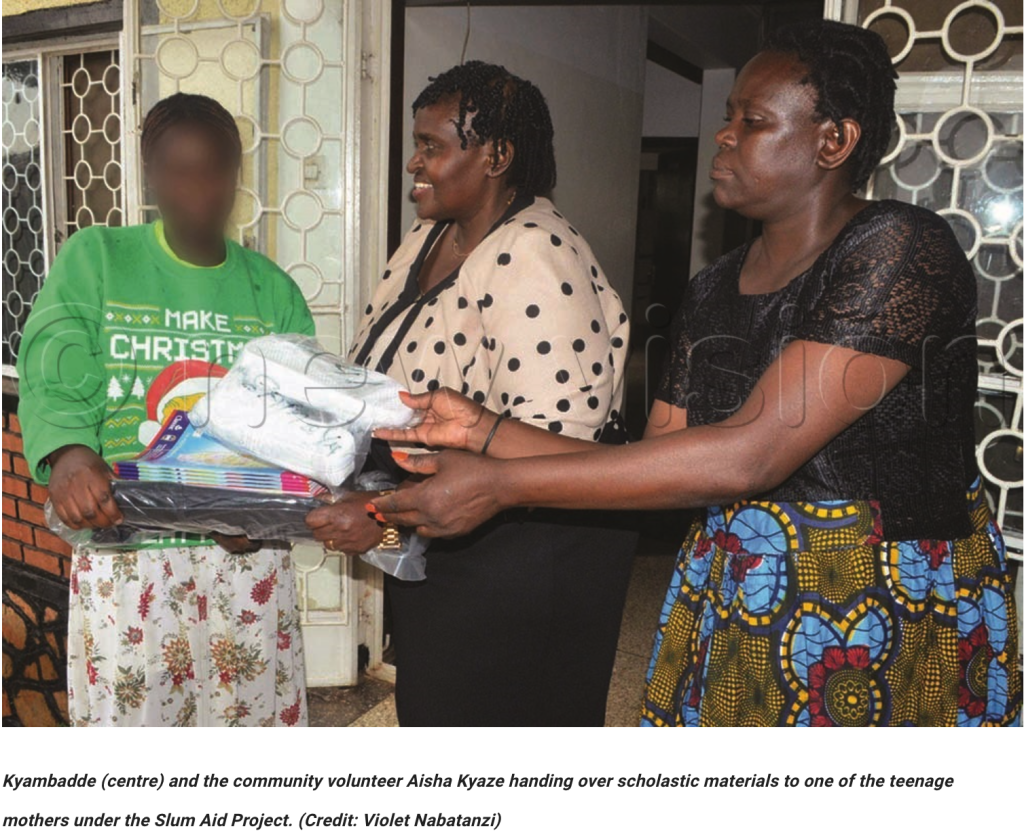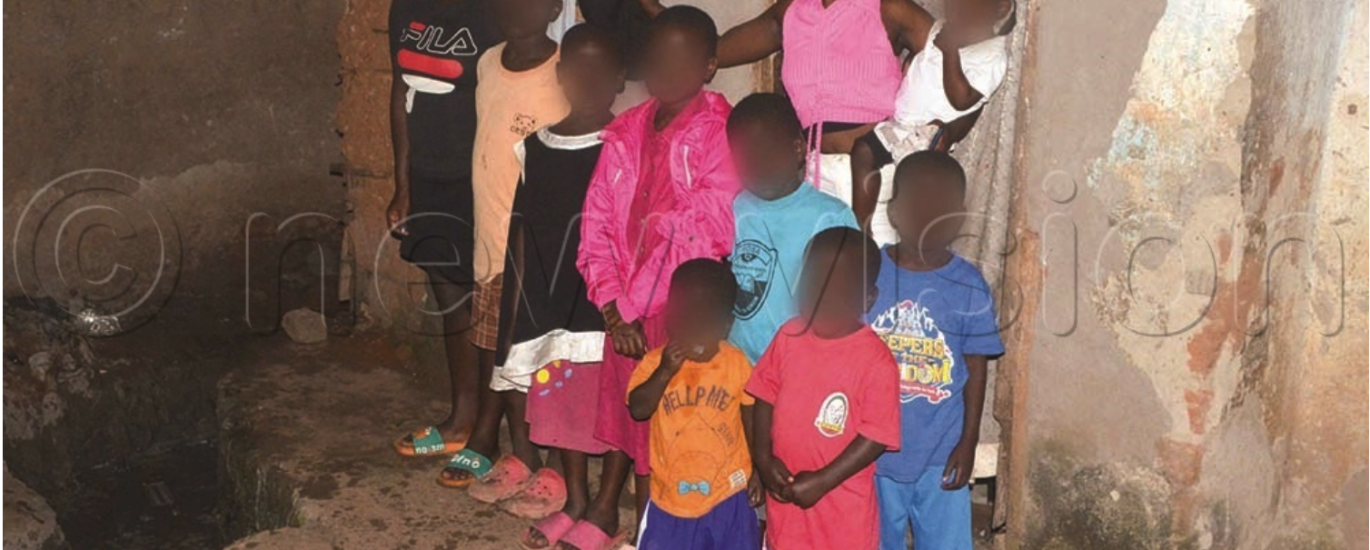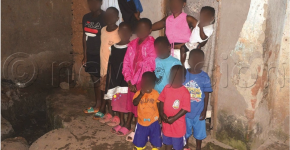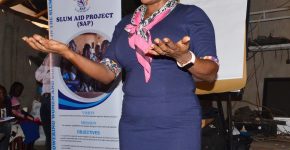Lack of life skills and sexual reproductive health and rights information makes many
adolescent girls susceptible to risky sexual practices..
KAMPALA – Lizik’s (second name withheld) life took a turn for the worst when she lost
both parents during the COVID-19 pandemic in 2021.
She was 15 years old at the time, in Primary Five and they lived in Katwe, a slum in 9 Kampala. The
death of her parents left behind eight children, the youngest being three years old now.
After the death of their parents, they became a child-headed family that struggled to survive.
Lizik says at first, there was a woman who would provide them with food, but she stopped after some
time due to hardships. When Lizik failed to pay rent, the landlord asked them to vacate the house.
She and her siblings left the house carrying their belongings – mainly clothes, small mattresses, and
shoes – in polythene bags and took them to the streets.
They lived on the streets for a few days until they moved to Katanga, another slum and started living
with other families in a bus shade built by the Kampala Capital City Authority (KCCA)
Lizik’s younger siblings would go for days without food. As the eldest, she started doing house chores
for residents in Katanga to earn money to feed her siblings Whenever it would rain heavily, their
belongings would get soaked.
Renting a shack
One day, a woman who was passing by the shelter was touched by the poor conditions in which Lizik
and her siblings were living. She approached Lizik and asked her why they were sleeping outside.
Lizik shared her story and the woman informed her about the single-room houses available for rent, for
which she could pay sh4,000 daily.
She advised Lizik to raise the money and provide shelter for her siblings. Taking the advice, Lizik, along
with her siblings, approached the landlord and asked to be availed a room for rent.
Initially, the landlord hesitated because of their ages, but Lizik pleaded and was given a house. To date,
she pays sh4,000 every day.
The mud and wattle shack has no electricity and is surrounded by an open sewage trench
Pregnant at 15
Lizik says life was difficult during the COVID-19 lockdown. She believed she had done everything she
could, but their situation continued to worsen each day.
It was during that time that she met a man who promised to help her and her siblings. Lizik thought she
had finally found someone who would help her take care of her family.
However, when she got pregnant, he abandoned her. Lizik was devastated.
“I did not even know where the father of my child lived,” she recalls. During that time, Lizik washed
clothes, dishes and fetched water for money.
“I went to Kawempe National Referral Hospital for antenatal care because the services were free. The
father of my child never checked on me during the pregnancy. I curse the day I met him,” she says.
Lizik gave birth under difficult circumstances and has since resumed school, courtesy of Slum Aid
Project, a non-government organisation based in Kampala.

She leaves her child and siblings under the care of her friend and goes to school. She would like to
become a lawyer in future. Although Lizik is in school, her siblings are not due to lack of school fees.
Whereas it might appear that public schools in 9 Kampala do not charge fees, they do. Mariam (second
name withheld) is another teenage mother who has been through thick and thin.
She had an affair with a young man who worked in one of the garages in Kampala.
Although the young man supported her at the beginning, he stopped after a month. Mariam got a job
where earned sh1,000 per week.
She used her savings and donations from well-wishers to give birth at Kawala Health Centre IV. Her
eight-month-old baby is now being cared for by her mother as she goes to school.
Agnes Kabanda Kyambadde, the executive director of Slum Aid Project, said with support from the
Hilden Charity Trust Foundation, they have so far enrolled over 30 teenage mothers from the Katanga
slum in school, the youngest being 14 years old.
What is fulling teenage pregnancies in Kampala slums?
Kyambadde says poverty is driving young girls into sex for survival, adding that lack of life skills and
sexual reproductive health and rights information makes many adolescent girls susceptible to risky
sexual practices.
“Parents in the slums have parenting challenges, such as failure to meet basic needs and increased substance abuse.
Denis Mugisha, the LC1 general secretary in Kimwanyi zone, Katanga slum, says some parents send
their children to sell items in traffic jam up to as late as midnight
“They tend to associate with male vendors and end up eloping with them,” he says.
Mugisha also says alcoholism fuels teenage pregnancy, adding that men in his area entice young girls
with money and impregnate them. For Beatrice (second name withheld), a single mother, her daughter
got pregnant at the age of 14.
She says when she asked her about the father of the baby, she said she was raped. Kabasinguzi’s
daughter had dropped out of school when she was in Primary Six, but has since resumed.
Statistics
Statistics indicate that in Uganda, one in four girls aged 15-19 years has had a child or is pregnant.
The 2022 Uganda Health demographic survey (UDHS, 2022) indicated that teenage pregnancy
stagnated at 24 %, but increased from 19% to 21% in urban areas.
The United Nations Education, Scientific and cultural Organisation (UNESCO) report indicated that
Uganda has the highest school dropout rate (70%) in East Africa, followed by Kenya and then Tanzania.
According to KCCA, from the financial years 2021/2022 to 2023/2024, a total of 226,357 mothers
accessed antenatal services on their first visit to the government health facilities in Kampala. Of these,
23,789 were teenage mothers. In the last three years, Kawaala Health Centre IV registered about 4,271 teenage pregnancies, while
Kisenyi Health Centre IV had 4,833.
Link to the Original Article on New Vision Newspaper





